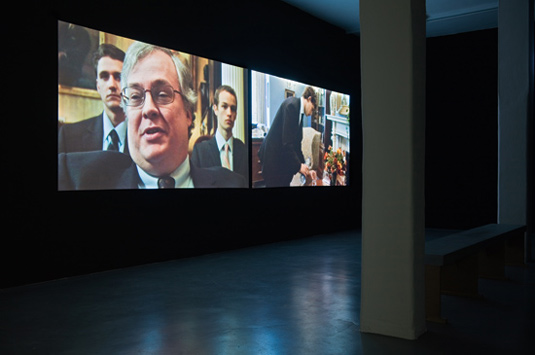| Julika Rudelius |
|
Isabel Meixner Julika Rudelius. Self-concept as the Object of Reflection“When an individual enters the presence of others, they commonly seek to acquire information about him or to bring into play information about him already possessed. [...] If unacquainted with the individual, observers can glean clues from his conduct and appearance which allow them to apply their previous experience with individuals roughly similar to the one before them or, more important, to apply untested stereotypes to him.” [1] This description of the structural fabric and mechanics of society by the eminent Canadian sociologist Erving Goffman also reads as a characterization of the art of Julika Rudelius. In her video works and photography, Julika Rudelius explores the relationships and bonds between people. She interrogates prejudices and clichés that shape attitudes and govern behavior. These are found both in established social classes as well as in groups on the fringes of society; in how one deals with what is familiar in one’s own culture, and in how one encounters the unfamiliar in other cultures. Often using her own vexations as a springboard, Rudelius focuses on specific people and their characteristics with empathy and precision, which results in an atmospherically subtle and condensed “document.” Born in Cologne in 1968, the artist today directs her gaze to her living environments in Amsterdam and New York. In the foreground of her work are forms of communication, verbal and non-verbal, that can be observed within specific groups or groupings and that essentially characterize their image. These are social codes, which social classes employ to define themselves against others, from which hierarchies within a class emerge and identity is created. To this purpose, business-like managers are interviewed separately in an archetypical office in the video Economic Primacy (2005). Each of the interviewees outlines his attitude towards money, its power factor and the advantages of a capitalist society. They share their personal thoughts on the concept of the welfare state, education and parenting. The men exude unshakeable self-confidence, which is driven by great ambition and signalizes success. The video Tagged (2003) presents a portrait of a group of Moroccan and Turkish teenagers who live in the Netherlands. The children of immigrants, they wear strikingly fashionable, expensive clothing. During the interview in a standard hotel room, they change their clothes and present them, naming the designer and the approximate price of the item. When asked about the reasons for their brand consciousness, they mention the desire for social acknowledgement and respect. What is revealed at the same time, however, is that they are adrift from the cultural environment of their family; they have taken over its values, but they have had only limited success in adapting them. [...] [1] Erving Goffman, The Presentation of Self in Everyday Life, Doubleday, New York, 1959, p. 1. Catalog excerpt "Extended. Sammlung Landesbank Baden-Württemberg" Editors: Lutz Casper, Gregor Jansen, published by Kehrer Verlag Heidelberg, 2009 ^
|
